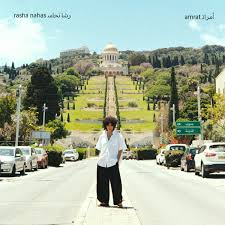
The Haifa-born Palestinian rock artist Rasha Nahas is breaking language boundaries and bridging cultural gaps with her heart wrenching music. She started her musical career at ten as a classical guitarist. Later in her teens, she began writing and playing her own songs, and grew to be a staple in Haifa’s underground scene. Her first release was an EP titled Am I, in 2016 with five tracks, all in English. She produced the EP between Bristol, in the UK, and Haifa, which is in Israel-occupied Palestine. After her release, she received invitations to tour all over the world, including SIM São Paulo, Glastonbury Festival, Midem, Sziget and Palestine Music Expo.
In 2021, Nahas released her debut album, Desert, in English, a theatrical-poetic rock narrative in which she sang of her journey from Haifa to Berlin, to critical acclaim. BBC4’s Loose Ends and Spotify:MicCheck featured Desert. She was among the first to receive the Bertha Foundation Artivism Award.
Nahas released an LP titled Amrat in 2023, partnering with Cooking Vinyl, a UK independent label. Amrat, unlike Am I or Desert, is entirely in Arabic, and, in contrast to what one would assume, the emotional idea of the song is more comprehensible. Nahas’s ability to surpass a language barrier through the sheer emotion she is capable of packing into her voice cannot be overstated.
“Ya Binti,” “Amrat,” and “Ryah Jnoob” are my favorite three tracks from the LP. I don’t speak Arabic, but Nahas’s enchanting voice and emotional music covered my language barrier with ease. I turned her Spotify on shuffle while making dinner and found myself dancing while my chicken burned. Later, after I rescued my dinner ,I looked up the lyrics and re-listened. Her words resonated with me in a way I rarely experience.
“Ya Binti” translates to ‘My Girl’ and has an intense sense of longing that transcends language. The chorus, in English, is, “I am here/ And you are there/ Sitting there, far away/ You are you/ But who am I?” The emotional impact of the lines is very similar to the English translation of the French version of, “I miss you,” which is, “You are missing from me.” The idea of change, of seeing a beloved individual and recognizing them, but not yourself, is so visible throughout “Ya Binti,” from the lyrics themselves to the emotion in Nahas’s voice.
“Amrat,” the title track, translates to ‘Sometimes’ and has a much more cool vibe to it than ‘Ya Binti’ even though the longing idea remains. The emotion is different, however. ‘Ya Binti’ is more the longing for a person, whereas “Amrat” is for an idea. Almost every line of the verses starts with the word ‘sometimes,’ and the first line, “Sometimes I long for my home land,” nearly whispered with so much love that, even without knowing what the words were, ‘Amrat’ fully caught my attention.
My favorite song in Amrat has to be “Ryah Jnoob,” which translates to “Southern Winds,” and that was before I read the lyrics. The end of the song has some of the most beautiful instrumental breaks I have ever heard, with lyrical strings, mostly violins, in a soaring melody, over a gentle but intense drum track with short, supportive chords on what I believe is either more violins or violas. The lyrics are angry and raw, the raging counterpart to the previous two examples’ longing. Nahas passionately sings, “Why does everything attach me to you?/ My girl, I tried to protect you/ A generation/ Of my voice/ And a generation/ Of a whip/ So roses can bloom/ It dies/ Southern winds/ Southern winds.” I listen to ‘Ryah Jnoob’ daily, and Nahas has quickly become one of my favorite artists.
If my ramblings on Rasha Nahas have piqued your interest, you can find her on Spotify here. If you want to look at the English translations for Amrat, you can find them here.
